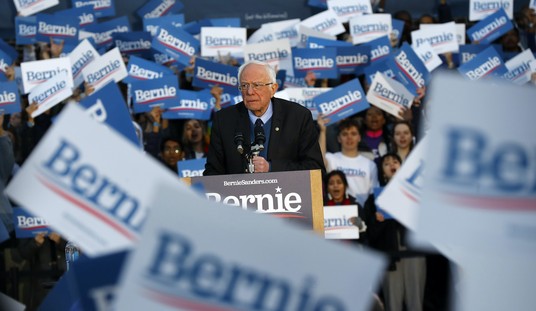The Libyan delegation to the UN, which had represented the Moammar Gaddafi regime until a few days ago, told CNN that they will now represent a new government being formed by the opposition. Deputy UN ambassador Ibrahim Dabbashi tells Eliot Spitzer says that the “youth leaders of the revolution” will submit to the will of the people as to the form of Libya’s new government, but in the meantime a “council” will run the nation:
The US has moved warships and other military assets closer to Libya in the last few days. The USS Enterprise awaits orders to pass through the Suez Canal into the Mediterranean, CBS reports, and a three-ship convoy with Marine amphibious units and helicopters will join Big E shortly. The White House hopes to use the pressure of the military threat to force Moammar Gaddafi to flee, but wants to make clear that it will need the EU as a full partner in any operations:
“First, jam Libya’s communications so that Qaddafi has a hard time communicating with his forces,” he told “Early Show” anchor Chris Wragge. “Second, send those Marines ashore to set up aid stations for the rebel areas. And third, establish a no-fly shown so that Qaddafi cannot use his air force against his own people.”
One thing that is not an option for the Pentagon: The U.S. taking on the situation by itself.
“The U.S. does not want to go to it alone here,” said Martin. “The famous ‘Pottery Barn rules’ apply here: You break it, you own it. And if there is chaos in Libya, the U.S. does not want to be the one country responsible for restoring order.”
Sanctions against Qaddafi’s government have been enacted to squeeze them financially and to cut off the flow of arms to the regime. U.S. Ambassador to the United Nations Susan Rice said on “The Early Show” this morning that Qaddafi must be shown that “the international community is not going to tolerate the slaughter of innocents.
Gaddafi is having a difficult time in that task anyway. He tried retaking Zawiya and Misrata today, but got repulsed by rebels. Significant parts of Gaddafi’s military have defected to the opposition, and the dictator’s forces had to face armored units defending those positions. Gaddafi has bombed arms depots with his air force, but some of his pilots appear to have qualms about his regime.
The Obama administration is correct in insisting on a comprehensive approach to the Libyan crisis. The aftermath of a Libyan collapse or civil war would impact the EU more than the US. While the American military would need to supply the logistics for any action taken in the Mediterranean, the political responsibility need to be widely shared in the West if any intervention is to take place.
Nowhere is that more obvious than in the refugee crisis the civil war has prompted:
Refugee officials say more than 140,000 people have fled Libya to Egypt and Tunisia in a growing exodus from Moammar Ghadafi’s forces as they kill hundreds and block humanitarian aid to western Libya.
U.N. refugee agency spokeswoman Melissa Fleming said Tuesday “the situation is reaching crisis point” at the Libya-Tunisia border where authorities say up to 75,000 people have fled Libya since Feb. 20.
The political situation in both Egypt and Tunisia are bad enough as it is. Adding tens of thousands of refugees and their humanitarian needs to the mix would tax both countries in the most stable of times. At present, with unrest in Tunisia and Egpyt, it’s a recipe for a wave of civil wars across north Africa, and a surge of refugees seeking asylum across the Mediterranean and into Europe.
The US pushed for Gaddafi to find somewhere else to live earlier today, but didn’t exactly sweeten the pot:
U.N. Ambassador Susan Rice on Tuesday urged defiant Libyan leader Moammar Gadhafi to consider exile, saying she’s worried the African nation could plummet into a “humanitarian disaster.”
“It’s important that he get off the stage,” Rice said in an interview on CBS’s “The Early Show.”
She said that exile “may be an option that he looks at.” But the ambassador added that not even that scenario would inoculate the iron-fisted rule from possible prosecution “for the crimes that he and those closest to him have committed.”
If Gaddafi flees to a jurisdiction where the US and UN writ won’t run, the question will be moot. Hugo Chavez and Venezuela would be one of the most likely places for Gaddafi to seek exile, but would the US allow Gaddafi to flee unmolested?








Join the conversation as a VIP Member